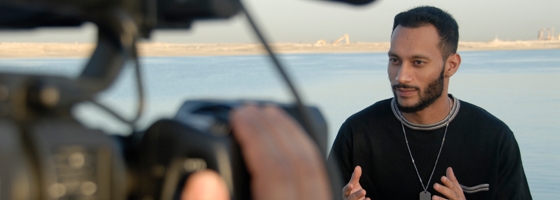A couple of months ago I taped a segment with my friend, Carol Roth. She was promoting her new book, The Entrepreneur Equation, in which she offers advice to people thinking about starting their own businesses.
In one section she addresses the importance of getting publicity for your business. Carol asked me to share media strategies as well as messaging and on-camera tips for entrepreneurs.
I started by asking a series of questions: Are you serious about getting publicity? Do you want to be seen as the best in your industry? Do you want to really excel at doing media interviews i.e. taking control of an interview and shaping the angle of the story?
OR: Are you happy just being interviewed? Are you content with just doing a decent job?
If it’s the latter, then you don’t need executive media training. You’ll get by on what – if any scraps—are thrown your way. There’s nothing wrong with that.
But if you don’t want to settle for second best AND you really want to learn how to play the media game—then I recommend that you sign your executives up for a media training for entrepreneurs program.
Real Life Scenario
Below is the story of a start-up in California that was getting a lot of buzz in the media a few months after it was founded. Even though the founders had little experience doing media interviews, and none on-camera, they opted not to invest in media training.
Media Interview
A TV news reporter shows up to do a story. The executives are interviewed. Their interviews are fine. One executive is really personable. Another is sort of intense but fine. And a third even gives a couple of good soundbites, but they are too “inside the game.” Most people at home won’t understand what he meant.
Did they do a decent job? Absolutely. Was it as good as it could have been? Not by a long shot. The reporter wound up doing a big picture story about new businesses. As a result, viewers didn’t learn much about this particular company or its services. They were merely one mention in a round-up of start-ups.
Had that team received media training for entrepreneurs, they could have greatly influenced the angle of the story. If they’d thought about their messaging ahead of time, they could have come up with soundbites about their business that were too good for the reporter to pass up. As such, they would have steered the reporter in the direction they wanted him to go i.e. focusing on their specific business as opposed to a big picture industry story.
Instead, this company got a mention. And it was a nice one. But this “mention” didn’t really help them because viewers still don’t know what they’re all about. These executives, who had an audience of millions in the palms of their hands, squandered an opportunity to really sell themselves and convince viewers to become customers.
Good Enough Versus Great
And that is the difference between flying by the seat of your pants– hoping that a story will go your way (good enough)… and taking the time to craft messages and soundbites that will sell the reporter and his viewers on your company. (Great!)
PS At the very least, you should be planting enough seeds with the reporter to make him want to come back and do another story on just your company. If they had been media trained, they would have known that.
More Blogs
If you liked this blog, you might like ROI of Executive Media Training.
Coaching
If you would like more information about working with us, please contact us. We would be delighted to customize a program that fits your exact needs.
Chicago-Based, National & Online Options
We are based in Chicago, but routinely work with clients on both coasts and everywhere in between. We also offer online coaching for those that prefer to work with us remotely.

